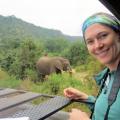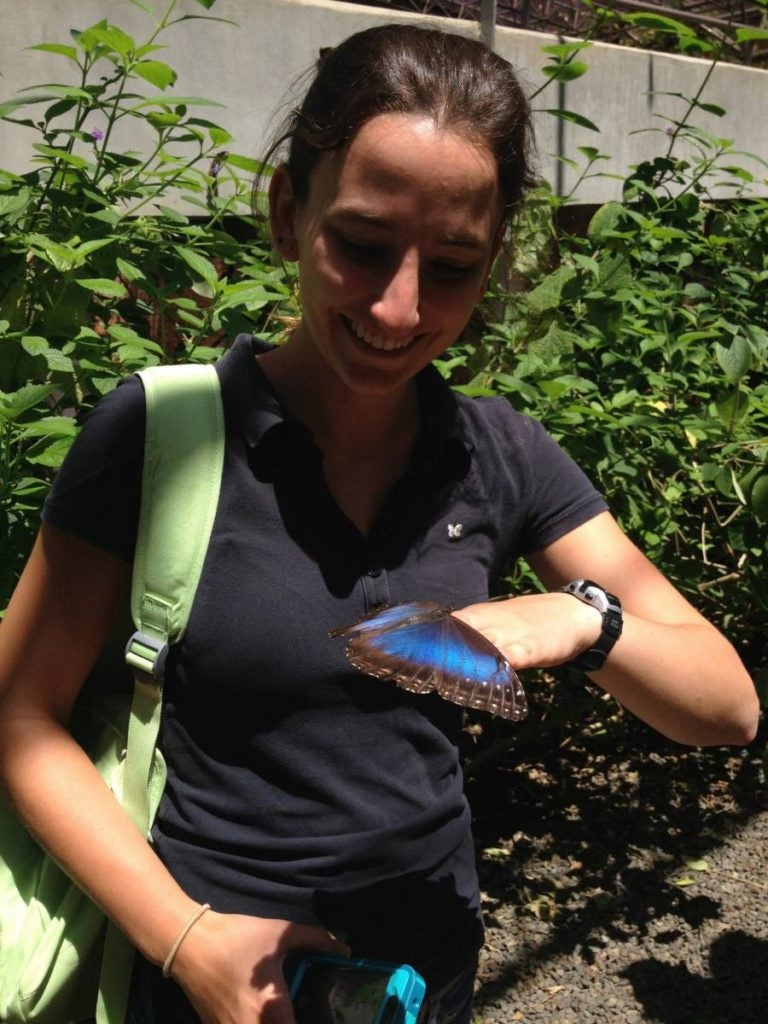AWARDS 2015
Biology Medals:
Awarded to the outstanding senior from each of the four majors.
Maggie Axelrod – Biology of Global Health Medal
I am a Biology of Global Health major. I chose this major because it gives a wide view of how biological concepts are important globally, while still teaching these concepts down to the molecular details. I’ve really enjoyed getting to apply biological principles to global issues. I work in Dr. Robert Clarke’s lab in the Lombardi Cancer Center. I love using research to answer questions about biology and see a brand new “story” unfold. Seeing this side of biology has had a huge effect on my biology education. I have a much greater appreciation for how new knowledge is discovered and how important these discoveries are. Being involved in research has also influenced my future plans. I am graduating this spring. I will be joining the MSTP (MD/PhD dual degree program) at Vanderbilt next year. I work in Dr. Robert Clarke’s lab in the Lombardi cancer center. I love using research to answer questions about biology and see a brand new “story” unfold. Seeing this side of biology has had a huge effect on my biology education. I have a much greater appreciation for how new knowledge is discovered and how important these discoveries are. Being involved in research has also influenced my future plans. I am graduating this spring. I will be joining the MSTP (MD/PhD dual degree program) at Vanderbilt next year.

Nicole Kelly – Taylor-Webber Award
I graduated in May 2015 majoring in Biology of Global Health (BGH). I chose the BGH major because, initially, it was quite outside my comfort zone. While I am fascinated by the molecular interactions that shape living organisms, I was very unfamiliar with how that knowledge fit into the broader context of public health at the local, national, and international levels. As a future doctor and citizen, I felt it was important to gain an interdisciplinary perspective of global health issues and improve my ability to both generate and communicate solutions; those skills are exactly what the BGH major has given me. Post-graduation in August 2015, I will begin medical school at Columbia University College of Physicians and Surgeons.
Christopher Jones – Biology Medal
I am a general Biology major and mainly chose Biology because of the opportunities it offered. I knew that I was interested in sciences in general and I thought that Biology, specifically the general Biology major, offered me the opportunity to see what interested me more specifically. For me, research has been really great because it allows me to bridge classes and life experience. I think there is a large conceptual leap between learning in class and applying that to work after graduation and I think that research has been extremely helpful in connecting the two. After graduation, I am planning to study medicine at the Feinberg School of Medicine at Northwestern University.

Margaret Stebbins – Environmental Biology Medal
I am an Environmental Biology major, and I chose this major because it aligned most closely with my interests in biology and the environment, particularly the areas focusing on the natural world and conservation. I have been passionate in these subjects since I was young, and this major allowed me to further explore those interests.
What initially drew me in to research in the Mann Lab was the exciting opportunity of studying such a charismatic species. I was also able to pursue my interest in conservation, as my thesis focused on tourism impacts on the Shark Bay dolphins. I would say that work in the Mann lab has defined my biology experience at Georgetown, as I’ve learned a lot from the actual research work and even more from everyone else involved in the lab. Being involved in research helped me realize what I’m most interested in, and it has given me a better understanding of the options available in this field after graduation.
I am graduating this May, and I will be working in Shark Bay, Western Australia as a field assistant this fall. I’m really looking forward to engaging in the field aspect of research with the Mann lab, and I can’t wait to see the dolphins!
Sarah Waye – Neurobiology Medal
I’ve always found it fascinating how little we actually know about the organ we use to “know” about the world around us, our brain. The cells, molecules, and processes that make up the brain are a fascinating and growing field of research, which is what interested me in the neurobiology major. In my research, I branched out and wanted to focus on my interest area, molecular signaling, in a brain tumor. I was most interested in my research because it was a risky topic that had been previously ignored in the literature. Being involved in research shaped my undergraduate experience. It helped me to better understand how to handle success and failure and gave me additional motivation and drive to press forward into the “unknown.” Additionally, my research experience defined my goals for the future, as I will be attending Washington University in St. Louis in the fall for a Ph.D. in Developmental, Regenerative & Stem Cell Biology.
The Chapman Medal
Awarded to the senior with the most outstanding research project.
Dongeun Heo
I chose to be a Neurobiology major simply because I have had the opportunity to get to know Professor Donoghue through Howard Hughes Program at Georgetown and to appreciate her teaching and advising. I also fell in love with neurodegenerative diseases and inflammation while working in Dr. Rebeck’s lab, which studies the role of ApoE in Alzheimer’s disease. I’m currently working in Professor Huang’s lab, where I’m looking into the role of inflammatory balance in remyelination. This project served as the stepping stone for me to further pursue the field of neuroimmunology at the graduate school level; I will be pursuing a Ph.D in Neuroscience at Johns Hopkins University.
RISE Book Winners:
Awarded to the student winners of the senior research project presentations during the research symposium.

Collin Leibold
I am a Biology of Global Health major because I am interested in communicating scientific information to the general public in order to educate and to improve health habits. I became interested in this major during the passing of the Affordable Care Act because it became clear that scientists and policymakers could improve their ability to communicate complex information to the public. My research in the department was an extension of these interests. I taught 10th grade biology at Cesar Chavez Public Charter School, testing a strategy called Writing Across the Curriculum, in which students learn writing in all classes. I was fascinated by my students’ writing; it offered a picture of their learning that I never could have gotten from multiple choice questions or traditional biology instruction. This research made me even more interested in writing, which leads me to my post-graduation plans. I will be studying Journalism at Georgetown while competing in my final year of eligibility on the Track and Field team.
Monica Gupta
I chose the Biology of Global Health major because I wanted to combine my biology education with a study of international issues, which interest me and are a key part of Georgetown culture. This major seemed like a good mix of both, and had the additional perk of including a significant component about communicating biology in non-scientific circumstances. I knew that this communication skill would be useful in a future healthcare career. This interest in communicating science was further realized by my participation in the RISE and Teach program. I chose to be a part of the RISE and Teach program because I have always been interested in teaching, and saw that this program provided a wonderful opportunity to finally follow it. I also knew that RISE and Teach would provide another chance to expand my education further into communication of science. This program provided the perfect opportunity to combine a variety of my interests, and it was too good to pass up. Although RISE and Teach is a very non-traditional biology thesis, I think it was important in my education, as I was forced to think about teaching biology, which adds a whole new dimension to my understanding of the subject. I look forward to taking the skills I have developed through my studies as an undergraduate and furthering them as I continue my education just a few steps away, at Georgetown School of Medicine, where I will begin my studies in the fall.

Laura Rosenwald
I am an Environmental Biology major here at Georgetown. Ever since I was little, I have been fascinated with how the natural world works. In particular, I am interested in animal behavior, and how it translates into the workings of the ecosystem. My research in the Weiss lab focuses on insect behavior, and how choices by an insect can influence the surrounding community. One of the reasons why I love working on research is because there is never an end point. Research constantly makes you ask questions, think critically, and be more curious about the world around you. As a result of my participation as an undergraduate researcher, I believe that I have become better at thinking critically, but also as a biologist. Not to mention, it’s pretty fun to be able to play with butterflies and caterpillars all day and call it research. My graduation plans include working as a research technician in other labs in order to gain some experience prior to graduate school.
Summer Research Award Winners:
Zukowski-Kolleng Summer Research Fellowship:
Monica Brady
I am an Environmental Biology major because I am really interested in learning about the environment and maybe one day helping to improve the quality of our natural environment. I was interested in getting involved in research because I wanted to gain more research experience. I had never really heard much about population genetics but it sounded like an interesting combination of genetics and ecology and I was interested in learning more about, so I started doing research in the Hamilton lab. This research has helped me to see how the theories and concepts that I have learned about in lectures can be applied to real organisms and real ecosystems.
Madeline Campbell
I am a double biology of global health and mathematics major which I chose primarily because I am interested in medicine, health and epidemiology. I work in the Bansal Lab, a computational disease ecology lab. My experience working with this research group led me to expand my academic interests to mathematics and, especially, mathematical modeling which has proved to be highly rewarding for me. While the work done in the lab initially intrigued me because of my interest in infectious disease, my experience as a part of the lab pushed me to pursue mathematics as a second major and explore the utility of applied mathematical concepts particularly within the field of biology.
Sara Carioscia
This is my third year at Georgetown, where I am majoring in Biology and Classics. As a freshman I read Richard Dawkins’ The Selfish Gene, which sparked my interest in evolutionary genetics. My research in the Patten Lab has led me to focus on the roles of particular genetic processes in grand-scale evolution and extinction. This summer I seek to model the introgression ratios among nuclear, mitochondrial and X chromosome genes in hybridization events.
GUROP:
Erica Rapheal
I am a Biology of Global Health major in Georgetown College. I chose that major because I am interested in health disparities abroad; after I graduate, I will likely get my PhD and eventually do epidemiological research in Africa or China. The research I am doing in the Rolfes lab now tests the effect of environmental stress on the growth of yeast cells. Working in the lab has helped me to confirm that I want to do research, rather than take a more policy-centric path.
Patrick Schlitt
My name is Patrick Schlitt and I am a junior in the college majoring in Biology. I chose Biology because I have been very interested in medical school for some time now, and I believe my experiences with classes in the Biology department have prepared me very well. I also work in Dr. Mann’s lab, on the Shark Bay Dolphin Research Project. I am very interested in Dr. Mann’s work and feel that studying a unique population of bottlenose dolphins has important consequences for both understanding how these dolphins interact, and also benefits their conservation. My experience thus far has allowed me to become much more comfortable reading scientific literature and answering complex problems. After college, I plan on attending medical school!
Breanna Walsh
When I was a senior in high school, I discovered the Biology of Global Health major and was instantly intrigued; while biology is my passion, I felt strongly about learning skills that would allow me to convey science-rich health information in a meaningful way to a wide audience, as no facet of health exists in a vacuum. I decided to come to Georgetown to be a Biology of Global Health major because I wanted to learn from an array of viewpoints and challenge myself to address health issues that compelled me. As a researcher in Professor Elmendorf’s lab, I’ve similarly challenged myself to take science beyond the classroom and approach big questions in a team setting. My absolute favorite aspect of research is the big, messy, question-filled mystery that I get to work on solving with an amazing group of passionate and curious colleagues. I find myself taking the skills I have learned through research and applying them to both my classes and my life. I’ve become a more engaged and active listener, a more questioning conversationalist, and, I feel, a better person in my efforts to pay closer attention to the world around me.
Kayleigh Hauri
I am a junior biology major with a concentration in ecology, evolution, and behavioral biology. I chose the biology major because I am interested in environmental and ecological issues, and through the biology major I can learn about those issues in a variety of ways ranging from policy to mathematical modeling. I got involved in research in the Wimp lab my sophomore year and it has been a great way to get hands-on experience with field research. In addition, following one project over several years has given me a much more in-depth understanding of how research is conducted and how processes we study in class impact systems in the real world.
Congratulations to each of the Awardees of 2015!